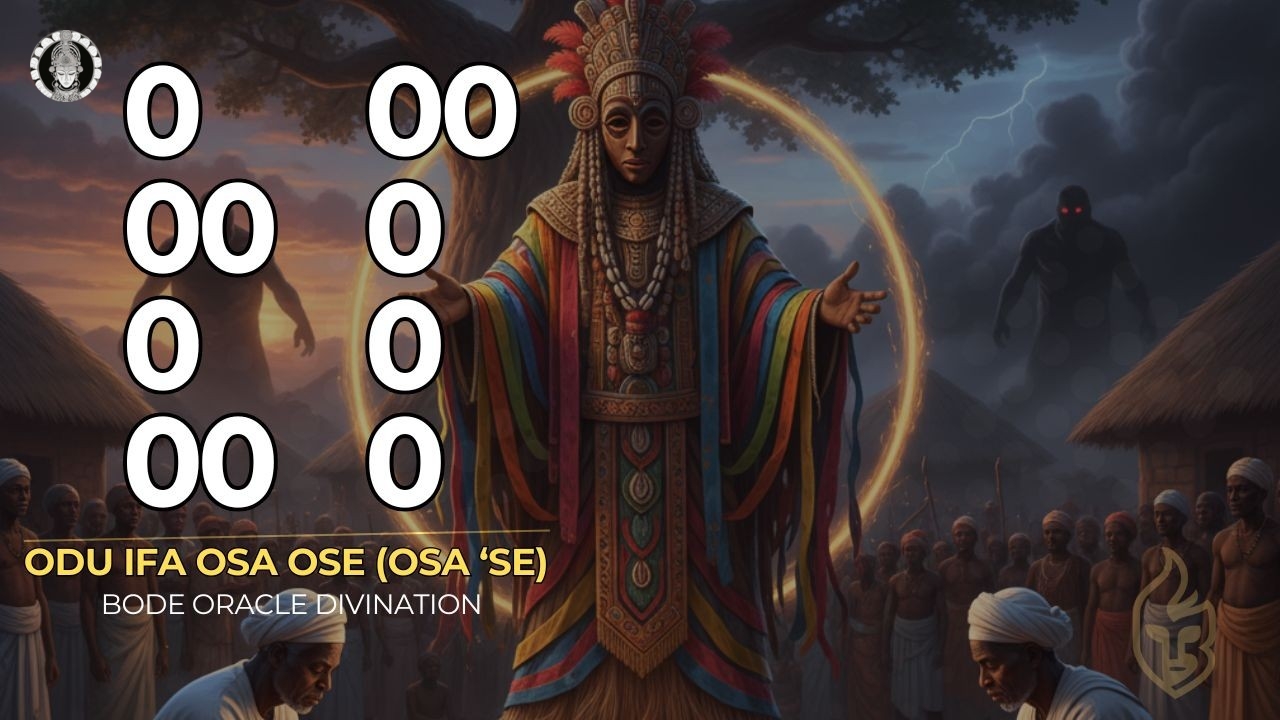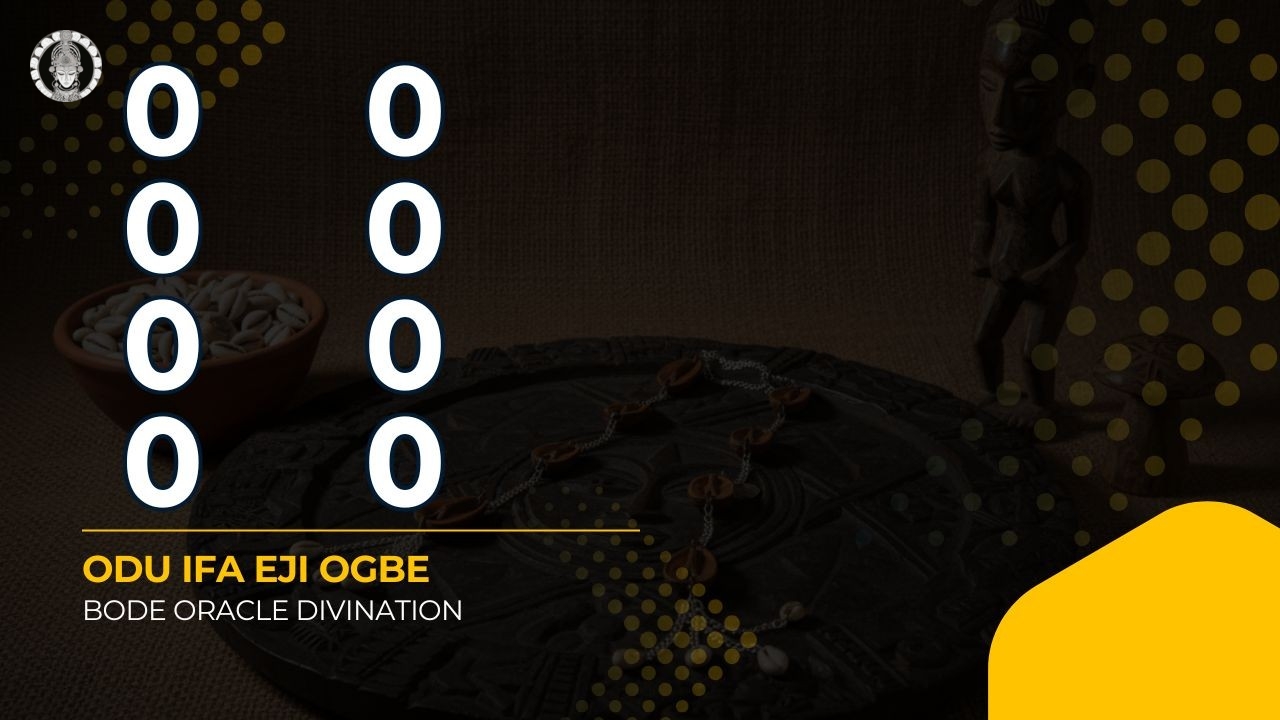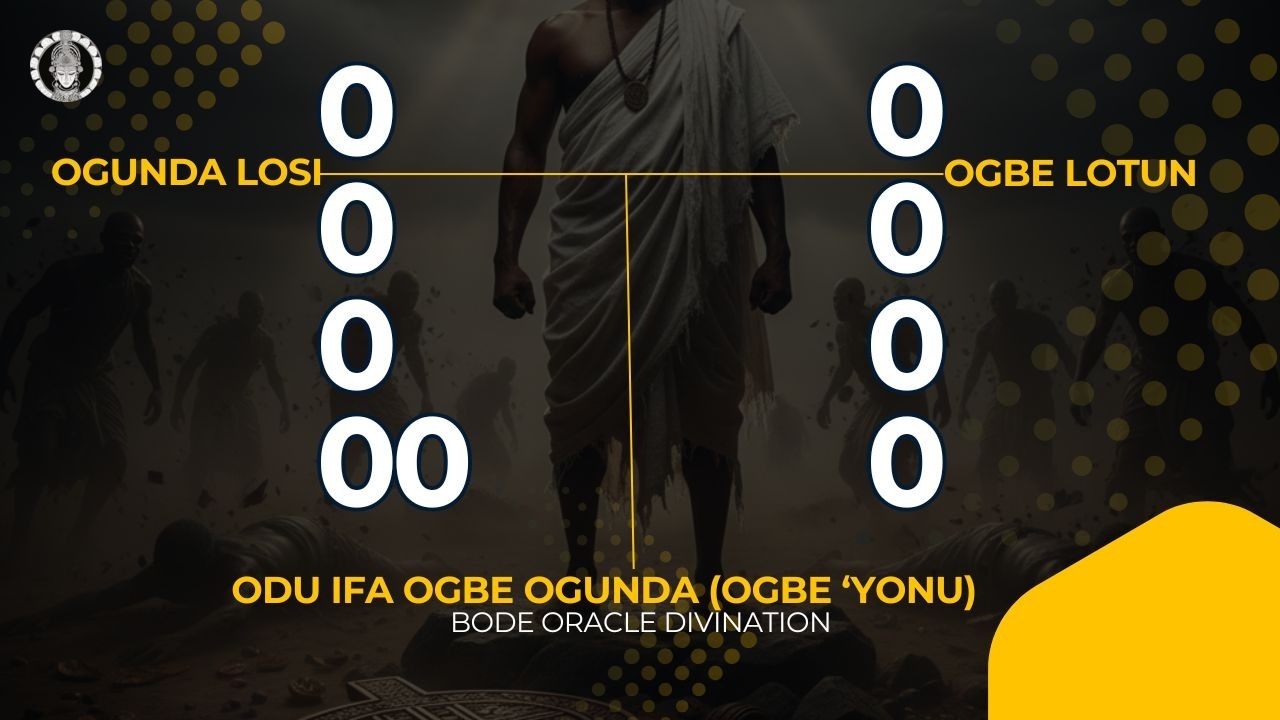Introduction to Odu Ifa Ogbe Ogunda (Ogbe Yonu)
Odu Ifa Ogbe Ogunda, also known as Ogbe Yonu, represents one of the 256 sacred divination signs in the Ifa corpus. This powerful Odu carries profound messages about the gift of children, the transformative power of patience, victory over death predictions, and triumph over enemies. Through the wisdom of Ogbe Ogunda, we learn how proper sacrifices and righteous conduct—particularly patience and forbearance—can transform barrenness into fertility, conflict into harmony, and death threats into longevity.
The divinations within Ogbe Ogunda address fundamental human experiences: the profound desire for children, the challenges of difficult relationships, threats from adversaries, and the fear of premature death. Each story serves as both practical guidance and spiritual instruction, teaching us that divine intervention through sacrifice, combined with patience and proper conduct, can reverse even the most challenging circumstances. The name "Ogbe Yonu" itself means "Ogbe opened" or "Ogbe revealed," emphasizing this Odu's power to open closed wombs, reveal hidden blessings, and transform seemingly impossible situations. For comprehensive understanding of the 16 Odu Ifa and their meanings, explore our detailed guide.
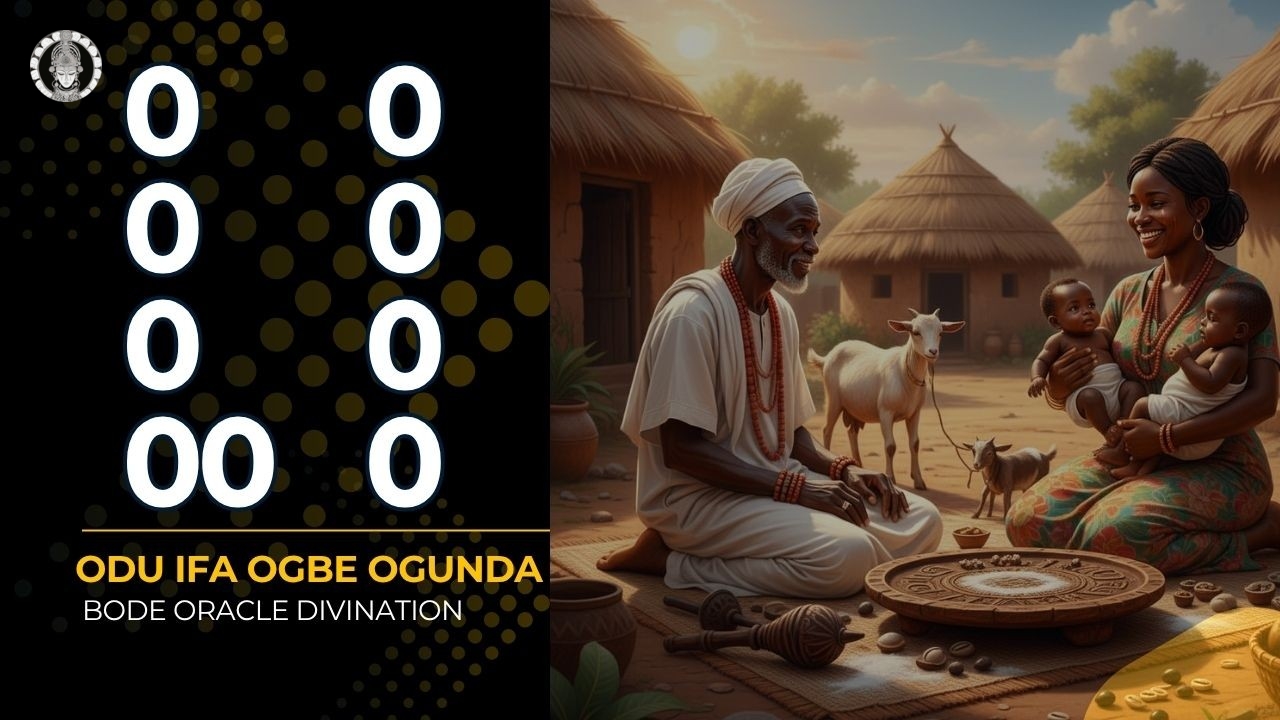
Ifa Divination for Oro and Agbalumo: The Parable of Two Barren Women
Understanding the Message of Fertility and Divine Timing
This divination from Ogbe Ogunda addresses one of humanity's most profound sorrows—childlessness. Ifa reveals the story of two barren women who represent Oro (the wild mango tree) and Osan Agbalumo (the African star apple tree). Both suffered deeply from their inability to bear children, their grief so intense that tears became their daily sustenance. This metaphor captures the emotional and spiritual anguish of barrenness, showing that the desire for children transcends mere physical yearning—it represents the fundamental human need for legacy, continuity, and the fulfillment of one's destiny.
What makes this divination particularly instructive is that both women received the same promise—they would bear children through sacrifice—yet the outcomes differed based on the nature of their offerings. This teaches a crucial principle in Ifa: while the spiritual solution may be the same, the specific manifestation of blessings varies according to what one offers and one's individual destiny.
The Symbolism of the Wild Mango and African Star Apple
The choice of Oro (wild mango) and Osan Agbalumo (African star apple) as the protagonists carries deep symbolic meaning. Both are fruit-bearing trees, yet they were paradoxically unable to produce their own offspring. The wild mango tree, known as the "black barren woman," represents those whose circumstances appear darker and more challenging. The African star apple, known as the "white barren woman," represents those whose struggles may appear less severe externally but are equally painful internally.
These trees, which naturally produce abundant fruit in their botanical form, were suffering spiritual barrenness—a reminder that physical capability means nothing without spiritual alignment. Their eventual fertility demonstrates that Ifa can restore what nature intended but spiritual obstacles blocked.
The Sacred Verse
Ọká gbé inú ìtẹ
Ọká ńyọ ri ọlá idada idada
Eré gbénú àbàtà ga orún oyé
A d'Ífá fún àgàn dúdú
A bù fún àgan pupa
Ẹkun ọmọ ni wọn ńsun.
English Translation
Gaboon viper leaves inside its abode.
Gaboon viper protrudes their heads majestically.
African rock python leaves in their abode majestically.
Ifá was cast for a barren black woman.
Simultaneously, Ifá was cast for a barren white woman.
They are crying for not having a child.
The Significance of Different Offerings
When both women consulted Ifa, they received identical prescriptions—offer a goat to receive the blessing of children. However, Osan Agbalumo (African star apple) moved first and offered a small goat. When she gave birth, her child was small. Oro (wild mango), observing this, decided to offer a large goat. When she gave birth, her child was large.
This teaches several profound lessons. First, there is a direct spiritual correlation between the nature of one's offering and the manifestation of blessing. Second, both outcomes represent success—neither the small child nor the large child is superior; both fulfill the fundamental desire for offspring. Third, divine timing differs for each individual—one woman received her blessing first, the other followed, but both ultimately achieved their heart's desire.
The Principle of Proportional Blessing
The relationship between the size of the sacrifice and the size of the blessing reveals an important spiritual principle. This is not about mechanical transaction but about spiritual alignment. The larger goat represented a greater investment, deeper faith, and more substantial commitment. It attracted a correspondingly greater physical manifestation. However, the smaller offering was equally valid and produced a blessing appropriate to it.
This teaches that individuals should offer according to their capacity and specific spiritual guidance. There is no shame in the smaller offering if it represents one's best and sincere effort. Conversely, those capable of greater offerings should not withhold, as their blessings will manifest proportionally.
Prescribed Offerings (Ebo)
For those receiving this divination regarding fertility challenges, Ifa prescribes a goat (ewure) as the primary offering. The size and specific characteristics of the goat should be determined in consultation with a qualified Babalawo, who will assess the person's circumstances, spiritual capacity, and destiny to recommend whether a small or large goat is appropriate. Explore more wisdom from our collection of Ifa teachings.
Modern Application and Understanding
In contemporary practice, this divination speaks not only to those seeking biological children but to all forms of fruitfulness—creative projects, business ventures, academic achievements, or any endeavor where one feels "barren" or unproductive. The principles remain constant: proper spiritual preparation through sacrifice, patience in waiting for manifestation, and understanding that the nature of one's investment influences the outcome. For scholarly perspectives on Ifa as a knowledge system, refer to UNESCO documentation on Ifa of the Yoruba People.
Ifa Divination for Iyawo: The Transformative Power of Patience
The Journey of Orunmila to Iwo
This divination from Ogbe Ogunda presents one of Ifa's most instructive teachings on patience, forbearance, and the transformative power of consistent gentleness. When Orunmila traveled to the town of Iwo as a divination priest, he performed Ifa consultation for the King and the townspeople. The people of Iwo were suffering from various misfortunes and spiritual difficulties. Orunmila prescribed sacrifices, which they performed, and their circumstances immediately began to improve.
Witnessing the dramatic positive changes in his kingdom and people, the King of Iwo pondered what gift he could offer Orunmila to express his gratitude. In a gesture of profound appreciation and honor, the King offered his own daughter to Orunmila as a wife. This was considered the highest honor—entrusting one's child to another demonstrates complete confidence and respect.
The Test of Patience
However, the King's daughter proved to be extraordinarily difficult. When Orunmila returned home from his divination work, he discovered that his new wife had deliberately pierced his sacred Ifa divination tray and burned it to cook her food. In Yoruba spiritual practice, the Opon Ifa (divination tray) is among the most sacred implements—destroying it represents not just disrespect but spiritual desecration.
This was not an isolated incident. The woman continued to engage in provocative and disrespectful behaviors designed to anger Orunmila. Yet remarkably, instead of responding with the justified anger that anyone might feel, Orunmila maintained his composure. He embraced patience, understanding that anger produces nothing beneficial.
The Sacred Verse
Ìbínú kó ṣe ńkan rere fún ni
Suuru ni baba ìwà
Àgbà tí ó bá ní suuru
Ohun gbogbo ló ní
AdÍfá fún Ọrúnmìlà
Lọjọ ti ó nṣawo rode Íwó
English Translation
Anger does not lead to anything good for us;
patience is the father of character.
The elder who possesses patience has everything.
Ifá was cast for Ọrúnmìlà
on the day he journeyed to the town of Íwó.
The Transformation Through Gentleness
The woman's transformation came through her own reflection. One day, she began to contemplate the person she had been tormenting. Despite all her provocations, disrespect, and destructive behavior, Orunmila had never responded with anger, harshness, or retaliation. His consistent gentleness and patience caused her to examine her own character.
She realized that if someone as gentle and patient as Orunmila could tolerate her behavior without becoming angry, he must possess exceptional character. This realization catalyzed a complete transformation in her conduct. She abandoned her provocative behaviors and became a model of good character and respectful deportment.
The Origin of "Iyawo"
When Orunmila returned home with his transformed wife, his followers inquired about her identity. Orunmila replied that she was his "Iya Iwo"—meaning "the trouble of Iwo" or "the suffering I experienced in Iwo." Over time, this phrase evolved into "Iyawo," which became the Yoruba term for wife.
This etymology carries profound meaning. It acknowledges that marriage and relationships inherently involve challenges, difficulties, and the need for patience. The term "Iyawo" embedded in the language itself serves as a permanent reminder that patience is essential in marital relationships and that even the most difficult beginning can transform into blessing.
The Wisdom of "Suuru Ni Baba Iwa"
The verse states "Suuru ni baba iwa"—patience is the father of character. This teaches that true character is not demonstrated when everything is pleasant and easy. Rather, character reveals itself precisely in how one responds to provocation, disrespect, and difficulty. Patience is called the "father" of character because it generates and nurtures all other virtuous qualities.
The verse also states that "the elder who possesses patience has everything." This is not metaphorical but literal spiritual truth. Patience attracts blessings, opens doors, transforms enemies into friends, and creates space for divine intervention. Those who lack patience may acquire temporary gains but cannot maintain them. Those who cultivate patience ultimately receive and retain all blessings.
Prescribed Offerings (Ebo)
While this divination emphasizes behavioral change over material sacrifice, Ifa does prescribe offerings to strengthen one's capacity for patience and to protect relationships from destructive conflict. The specific offerings should be determined by a Babalawo based on individual circumstances. For understanding the artistic and cultural dimensions of Ifa practice, explore UNESCO recognition of Ifa divination system.
Application to Modern Relationships
This teaching remains profoundly relevant for contemporary relationships. In a culture increasingly characterized by quick reactions, immediate gratification, and low tolerance for difficulty, Ogbe Ogunda teaches the opposite approach. Difficult relationships, whether marital, familial, professional, or social, require patience as the foundation for transformation.
The story does not advocate for accepting abuse or remaining in dangerous situations. Rather, it teaches that when one possesses the safety and capacity to exercise patience, this virtue can transform hearts and create outcomes that aggression or retaliation never could. Modern practitioners should work with qualified Babalawos to understand how these principles apply to their specific circumstances.
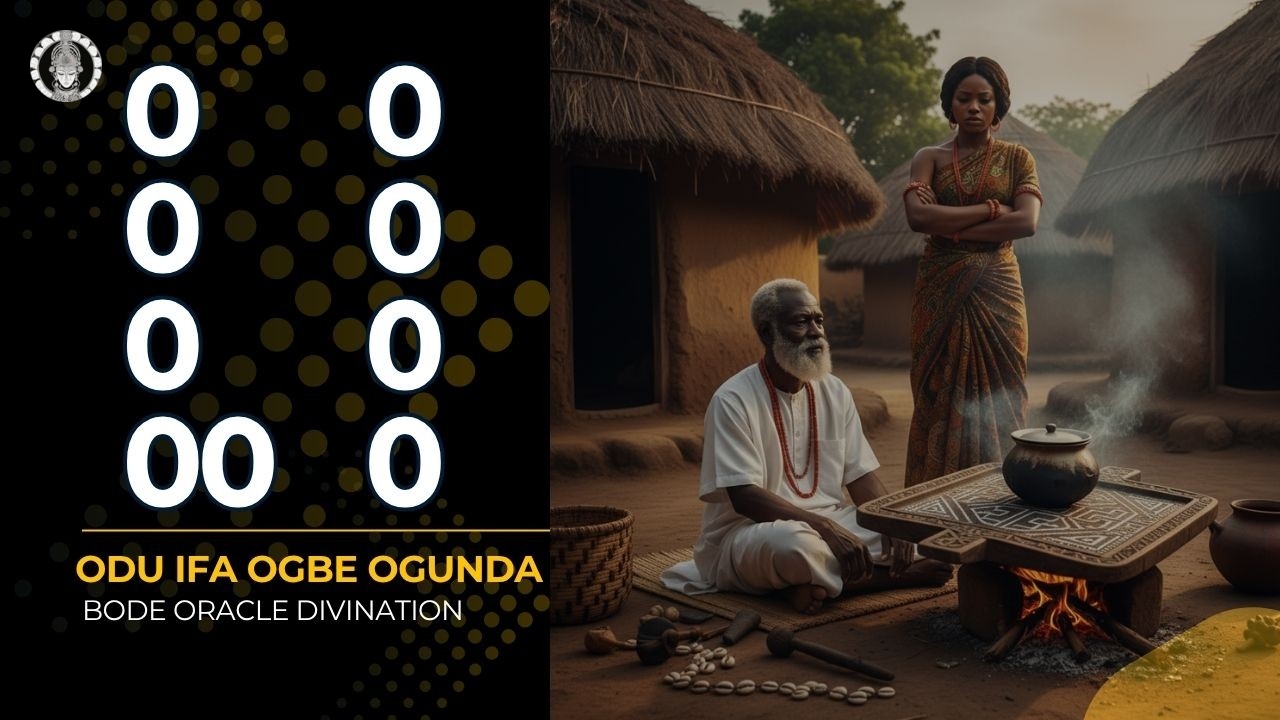
Ifa Divination for Nko Ni Se Bayii Ku: Defeating Death and Enemies
The Reality of Spiritual Warfare
This divination from Ogbe Ogunda confronts one of life's most frightening realities—the existence of enemies who actively work for one's destruction. The protagonist, whose very name "Nko Ni Se Bayii Ku" means "How will this one die?", faced adversaries who publicly declared their intention to ensure his demise. These enemies were not content with mere opposition; they actively sent spiritual attacks (ajogun) against him, seeking to fulfill their malicious prophecy that he would not survive in the world.
What makes this divination particularly relevant is its acknowledgment that some opposition is not based on anything the victim has done. The enemies' hostility stemmed not from any offense but from their determination to prevent this person from thriving. This reflects a spiritual reality: not all opposition can be resolved through reconciliation or behavior change. Some battles require spiritual intervention and divine protection.
The Sacred Verse
Sègi dudu lawo inú igbo
Àyìnrin a bèdó gòlòńtọ
Báábá ni í ṣawo ayé
A d'ífá fún Nko Ni Se Bayii Ku
Tí í ṣe ọmọ onípapósin
L'ójó tí i rayé alái nikú
English Translation
Black Segi is the priest of the forest;
Antelope with the big liver;
Baaba is the priest of the earth.
Ifá was cast for Nko Ni Se Bayii Ku,
The child of the Onipaposin,
On the day that he's going to the world without sudden death.
The Reversal of Evil Prophecy
The transformation in this story is dramatic and complete. Enemies declared that Nko Ni Se Bayii Ku would not survive, that they would ensure his death. However, through proper consultation with Ifa and performance of the prescribed sacrifices, not only did he survive, but his enemies themselves began to die. The death they intended for him returned to them.
This demonstrates a fundamental principle in Yoruba spirituality: properly performed sacrifices create spiritual protection that not only shields the individual but redirects negative energy back to its source. Those who send spiritual attacks without justification expose themselves to the consequences of their own malice.
The Symbolism of Forest and Earth Priests
The verse references "Black Segi, the priest of the forest" and "Baaba, the priest of the earth." These represent different dimensions of spiritual authority and protection. The forest priest symbolizes the wild, untamed spiritual forces that exist beyond human control—the primal powers that can be invoked for protection. The earth priest represents foundational, grounding spiritual authority—the solid protection that comes from being properly aligned with one's destiny.
Together, these priests represent comprehensive spiritual protection that operates in all realms—both in the visible world (earth) and in the spiritual wilderness (forest) where unseen battles occur. When one secures protection from both dimensions, enemies cannot succeed regardless of their methods.
The Metaphors of Longevity
The verse concludes with powerful metaphors of perpetual youth and longevity. The snail, upon hearing the protective incantations, begins to crawl—symbolizing that even slow-moving creatures will outlive aggressive enemies. The bird called Ologose cries like a young child, representing the preservation of youthfulness. The ram declares "I will not die," embodying strength that endures. The Eliri rodent "always remains young," symbolizing eternal vitality.
These metaphors teach that true longevity comes not from physical strength or aggression but from proper spiritual protection. Those who align themselves with Ifa's guidance and perform prescribed sacrifices access spiritual forces that guarantee survival regardless of enemies' efforts.
Prescribed Offerings (Ebo)
For protection against enemies and reversal of death predictions, specific sacrifices are required. These offerings create spiritual barriers that enemies cannot penetrate and establish divine protection that ensures longevity. The exact nature of these offerings varies based on individual circumstances and should be determined by a qualified Babalawo who can assess the specific spiritual threats and prescribe appropriate countermeasures.
Modern Application and Spiritual Warfare
In contemporary society, enemies may manifest differently than in traditional contexts—through workplace opposition, legal battles, social media attacks, or other modern forms of conflict. However, the spiritual principles remain constant. When one faces opposition rooted in malice rather than legitimate grievance, spiritual protection becomes essential. For deeper understanding of Yoruba spiritual philosophy and divination systems, consult scholarly research on algebraic characterization of Ifa divination codes.
Ifa Divination for Alateode: The Blessing of Twins
The Promise of Double Blessing
This divination from Ogbe Ogunda presents a unique and specific promise—the birth of twins (ibeji). Alateode, whose name relates to one who works with rope or cord, represents all those who labor with their hands yet find themselves unable to produce the ultimate fruit—children. Her barrenness was particularly painful because her very occupation involved binding and creating, yet she could not create the most important thing: offspring.
What distinguishes this divination from the earlier story of Oro and Agbalumo is its specificity. While the two trees learned that children would come but did not know how many, Alateode received a precise revelation: she would bear twins. This demonstrates that Ifa's knowledge extends beyond general promises to specific details about the nature of blessings.
The Sacred Verse
Àbò wá l'éré ọjá
A d'Ífá fún alátẹóde
Tí yí óò l'óyún Ogbè òun Ògúndá ninu
English Translation
A reward is the profit of the market;
Ifá was cast for Alateode;
This one will conceive through Ogbè and Ògúndá.
The Significance of Twins in Yoruba Culture
In Yoruba cosmology, twins (ibeji) are considered highly sacred and blessed. They are believed to share one soul between two bodies, representing unity in duality. The birth of twins brings special blessings to a family and requires specific spiritual protocols and celebrations. Twins are associated with Shango, the deity of thunder, and are considered to possess special spiritual powers.
When Ifa promises twins, it signifies not just the end of barrenness but the arrival of exceptional blessing. Alateode's transformation from barren woman to mother of twins represents the ultimate reversal—from the lowest point of childlessness to the highest form of fertility blessing.
The Transformation from Rope to Brass
The verse concludes with a powerful image: "Alateode then stopped using rope; she started using brass to beautify her children." This transformation holds deep symbolic meaning. Rope (okun) represents her former state—simple, functional, but not prestigious. Brass (ide) represents honor, wealth, and high status.
This change symbolizes the complete transformation in her circumstances. The woman who once worked with simple rope, perhaps in poverty and obscurity, now possesses the wealth to adorn her children with brass ornaments—a sign of prosperity and elevated status. This teaches that fertility blessings often accompany other forms of abundance, as the spiritual opening that allows children to come also permits other blessings to flow.
The Market Metaphor
The phrase "a reward is the profit of the market" (àbò wá l'éré ọjá) carries profound meaning. In traditional Yoruba society, the market represents the place of exchange, transformation, and blessing. One brings goods to market and receives profit—a direct exchange of effort for reward. This metaphor teaches that spiritual work operates on similar principles: proper sacrifice (what you bring) results in blessings (the profit you receive).
The market also represents community, social connection, and the public nature of blessing. Just as market success is witnessed by all, Alateode's transformation from barren to mother of twins became public testimony to Ifa's power. Her blessing served not only her personal fulfillment but also demonstrated to the community that Ifa's promises manifest tangibly.
The Role of Ogbe and Ogunda
The verse specifically states that conception will occur "through Ogbe and Ogunda" (l'óyún Ogbè òun Ògúndá ninu). This reveals that the combination of these two Odu creates the spiritual formula for twin birth. Ogbe, the first and primordial Odu, represents beginnings, openings, and divine blessing. Ogunda represents victory, overcoming obstacles, and the power to defeat opposition.
Together, they create the spiritual force necessary to open closed wombs (Ogbe) and overcome the obstacles that prevented conception (Ogunda). The specific mention of both Odu teaches that twin births require the convergence of opening power and overcoming power—both the divine favor to conceive and the spiritual strength to carry and deliver two children simultaneously.
Prescribed Offerings (Ebo)
For those receiving this divination regarding fertility, specific offerings are required to activate the promise of twins. These offerings create the spiritual conditions necessary for double conception and safe delivery. A qualified Babalawo should be consulted to ensure proper preparation and presentation of these sacrifices, as the spiritual work for twin births requires particular precision and care.
Modern Relevance and Application
In contemporary medical understanding, twin conception involves complex biological factors. However, Yoruba spiritual tradition recognizes that spiritual forces influence all physical manifestations, including conception. Modern practitioners often combine medical consultation with spiritual preparation, understanding that both physical and spiritual dimensions contribute to fertility outcomes.
This divination also speaks metaphorically to any situation requiring "double blessing"—two opportunities arising simultaneously, dual successes, or paired achievements. The principles of proper sacrifice, patience, and faith in divine promises remain applicable across various contexts of seeking abundance.
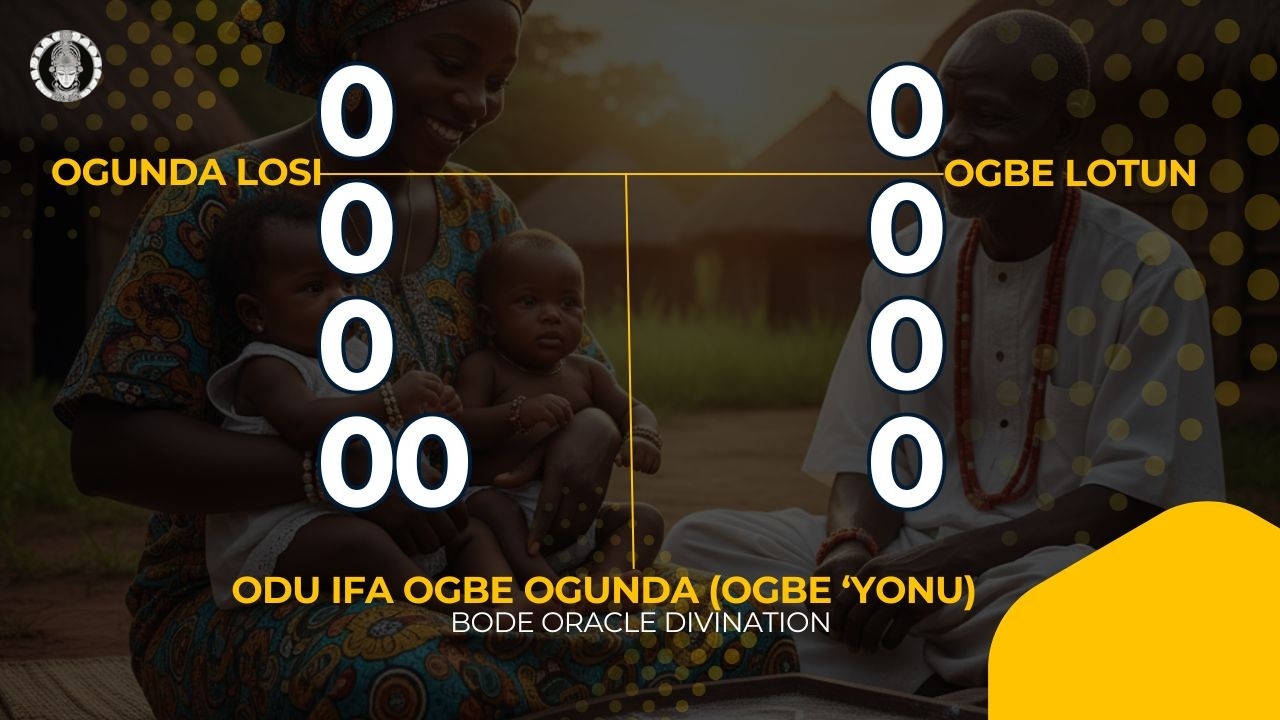
Additional Resources
Internal Links
- Complete Guide to Ogbe Ogunda - Detailed information, taboos, and practices
- Ogbe Ogunda Blog Post
- Bode.ng Blog - Extensive collection of Ifa and Yoruba spirituality articles
- Complete Odu Ifa Directory
- All About the 16 Odu Ifa and Their Meaning
External Resources
- African Traditional Religions: Ifa Divination - Duquesne University
- Ifa of the Yoruba People of Nigeria - UNESCO
- UNESCO Recognition of Ifa Divination System
- Algebraic Characterization of Ifa Main Divination Codes
- Ifa Divination System - Wikipedia
- Opon Ifa (Divination Tray) - Wikipedia
Connect With Us on Social Media
- BODE Oracle on TikTok
- BODE Oracle on YouTube
- BODE Oracle on Facebook
- BODE Oracle on X (Twitter)
- BODE Oracle on Pinterest
Visit Bode.ng to explore more divination teachings, participate in quizzes and polls, and connect with our community of practitioners and learners. Register today to access exclusive content and personalized guidance on your spiritual journey.
Frequently Asked Questions And Answers About Odu Ifa Ogbe Ogunda (Ogbe Yonu)
Find answers to common questions about this sacred Odu Ifa and its divination teachings
Ogbe Ogunda, also called Ogbe Yonu, is one of the 256 sacred Odu (divination signs) in the Ifa corpus. It carries profound messages about childbearing, patience in relationships, overcoming death predictions, and victory over enemies. This Odu teaches that proper sacrifice combined with patience and righteous conduct brings blessings of children, longevity, and triumph over adversaries.
Ogbe Ogunda contains multiple divinations addressing fertility challenges. The story of Oro (wild mango) and Osan Agbalumo (African star apple) teaches that childless individuals can bear children through proper sacrifice. The size of the offering determines the size of the child. The divination of Alateode specifically promises twins when the prescribed sacrifices are performed, demonstrating Ifa's power to grant fertility blessings.
The divination for Orunmila in Iwo teaches that patience is the father of character. When Orunmila received a difficult wife from the King of Iwo, instead of responding with anger to her provocations, he maintained patience. His consistent gentleness eventually transformed her behavior. This story shows that patience and forbearance can change hearts and situations, and it explains the Yoruba term 'Iyawo' (wife), which originally meant 'Iya Iwo' (the trouble of Iwo).
The divination of Nko Ni Se Bayii Ku demonstrates Ifa's power to reverse death predictions and defeat enemies. When enemies declared that someone would not survive, proper sacrifice reversed the prophecy—the person lived while their enemies perished. The verse teaches that through prescribed offerings and spiritual protection, one can overcome malicious prophecies and outlive adversaries.
This parable teaches several principles: that barrenness can be overcome through sacrifice, that the nature of one's offering affects the outcome (small goat brought small child, large goat brought large child), and that both types of blessings are valuable. It also demonstrates that divine timing differs for each person—one received blessing first, the other followed, but both ultimately achieved their desire for children.
Ogbe Yonu means 'Ogbe opened' or 'Ogbe revealed,' suggesting the opening of the womb for childbearing or the revelation of blessings. This alternative name emphasizes the Odu's primary focus on fertility, opening closed situations, and revealing hidden potentials. The name captures the essence of transformation from barrenness to fruitfulness that characterizes this Odu.
Ogbe Ogunda prescribes different offerings for different situations. For childbearing, a goat (ewure) is the primary offering—small or large depending on desired outcome. For overcoming enemies and death predictions, sacrifices to specific spiritual forces are required. All offerings should be performed under the guidance of a qualified Babalawo who can ensure proper procedures and invoke necessary incantations.
The divination of Alateode reveals that when this Odu appears for someone seeking children, twins (ibeji) are promised. After barrenness, the woman performs the prescribed sacrifice and gives birth to twins. This demonstrates Ifa's precision in revealing not just that children will come, but the specific nature of the blessing. Twins are considered highly blessed in Yoruba culture.
The Iyawo story teaches that responding with patience rather than anger to provocations ultimately transforms situations. Even when his wife deliberately destroyed his Ifa divination tray and engaged in other provocative behaviors, Orunmila maintained composure. This patience eventually caused her to reflect on her actions and change her behavior. The Odu warns that anger produces nothing good, while patience brings all blessings.
The verses reference the Gaboon viper and African rock python leaving their abodes majestically, symbolizing that even dangerous or challenging situations can be navigated with proper spiritual preparation. The references to animals and their characteristics teach that each being fulfills its nature—those who make proper sacrifices will fulfill their destiny of having children, defeating enemies, or achieving other blessings.
The principles of Ogbe Ogunda remain relevant today. Challenges with fertility, difficult relationships requiring patience, threats from adversaries, and negative prophecies are timeless human experiences. The Odu teaches that spiritual intervention through proper sacrifice, combined with patience and right conduct, can transform any difficult situation. Modern practitioners work with qualified Babalawos to adapt traditional prescriptions to contemporary contexts while maintaining spiritual efficacy.
Explore comprehensive information through: Complete Guide to Ogbe Ogunda at bode.ng/ogbe_ogunda for detailed taboos and practices, Ogbe Ogunda Blog Post at bode.ng/read-blog/185_ogbe-ogunda.html, Bode.ng Blog at bode.ng/blogs for extensive Ifa articles, Complete Odu Ifa Directory at bode.ng/odu/, and Bode.ng at bode.ng for divination services. Connect on social media: TikTok, YouTube, Facebook, X (Twitter), and Pinterest @BODEOracle.
